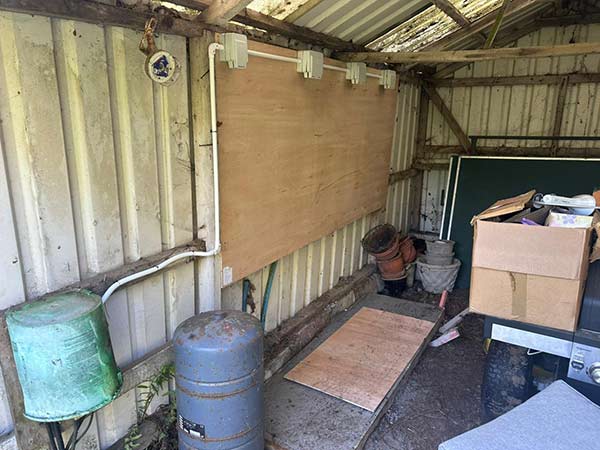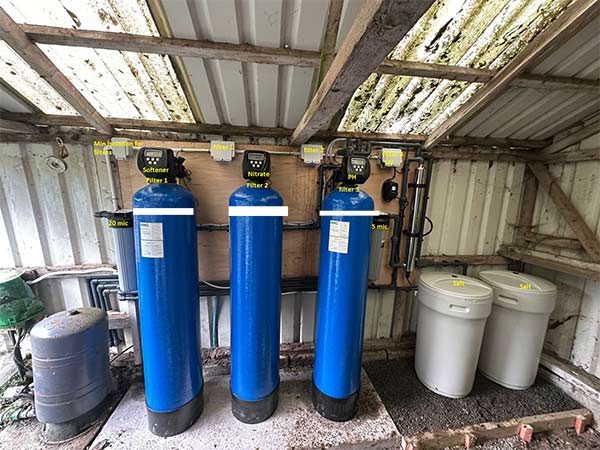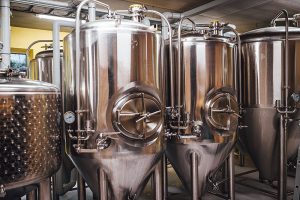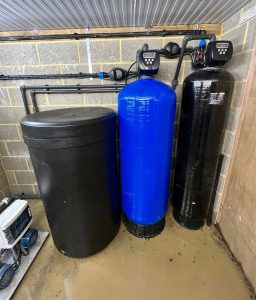We recently supplied to equipment for a small diary far located in a rural area, which relies on a borehole for its water supply. The farm sustains a heard of 50 dairy cows, requiring high-quality water for drinking, cleaning equipment and milk processing. The untreated borehole water posed risks due to potential contamination, including high mineral content, microbial presence, and sediment, all of which could impact animal health, milk quality and operational efficiency.
To address these issues, the farm invested in a comprehensive water treatment tailored to its needs.


We had the following to contend with
- High PH
- Nitrate
- Hardness
- Coliforms
We provided specification for the following
- 1 of 20-micron pre-filter
- 1 of 14×65 Softener Unit
- 1 of 14×65 Nitrate Unit
- 1 of PH Correction Unit
- 1 of 5-micron pre-filter
- 1 of Luminor Ultraviolet Disinfection Unit
The micron pre-filter is an essential component of a water treatment system because it helps remove sediment, particulates and other debris from the water before it enters more sensitive or specialised treatment stages.
These filters are a cost-effective way to improve the performance, efficiency and longevity of the water treatment system. It ensures that downstream components can operate optimally and reduce overall maintenance costs.
Next, we have the softener unit, this is to address the issue of hardness found in the water report we received from the farm. Hard water is water with high concentrations of calcium and magnesium ions. This softener unit was essential in this water treatment set up as it
enhances operational efficiency, ensures compliance with dairy hygiene standards and protects equipment and animal health.
The nitrate removal unit we provided is used in borehole water treatment systems to address the presence of nitrates, which can be harmful to both human healthy and agricultural operations. Nitrates commonly enter groundwater through agricultural runoff, fertilizers, septic systems, and animal waste. For farms like this small dairy ones, nitrate levels in water must meet regulatory limits to ensure compliance with health and safety standards, so this was a very important product to be used in this water treatment system.
For example, the World Health Organization (WHO) and other bodies recommend a maximum nitrate level of 50ppm (mg/L) for drinking water. Before we added this water treatment installation the nitrate level was 90ppm. (mg/L).
Borehole water often has pH levels that are either too acidic or too alkaline, depending on the local geology and groundwater characteristics. Correcting the ph ensures the water is suitable for all farm operations.
Having low ph for example, which is what this farm had, can cause problems in water as it’ll be acidic which is corrosive and can damage pipes, pumps and storage tanks, leading to leaks and frequent maintenance.
Alkaline water, high ph, can cause scaling, clogging pipes and reducing equipment efficiency.
By adding this ph correction unit, the water was neutralized to a pH o 7.2, resulting in:
- 10% increased water intake by cows.
- Reduced equipment corrosion and maintenance costs
- Improved milk production and quality.
A pH correction unit is a critical component for dairy farms using borehole water. It ensures water is safe and suitable for livestock, equipment, and milk processing while protecting the environment and soil health. Proper pH balance enhances farm efficiency, productivity, and long-term sustainability.
Finally, the UV. We only stock and sell the fabulous Luminor UV’s as they are just the best in the market and have multiple added features you can add to you UV like:
- UV Intensity Sensor
- Remote Alarm
- SHERPA
- Solenoid Module
- Cooling Fan
- Temperature Management Dump Valve
Borehole water often contains harmful microorganisms such as bacteria, viruses, and protozoa due to contamination from surface runoff, animal waste, or septic systems. UV
sterilisation is an effective, chemical-free method to disinfect water and prevent these issues. Borehole water can also harbour harmful pathogens such as E. coli, Salmonella, and Cryptosporidium, which can cause, illness in livestock and contamination of milk and equipment.
Having a water treatment installation improves animal health, ensures product safety, maintains equipment efficiency and minimises environmental risks, all of which are vital for sustainable and profitable farming operations.



